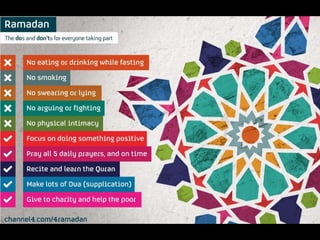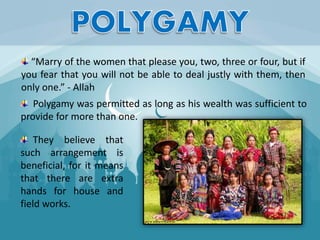Islam
- 2. One of the three major Abrahamic religions in the world. Islamic Faith
- 3. The world "Islam" literally means “surrender to Allah”, the Islamic God. Islamic Faith
- 4. It was founded in Arabia by the Prophet Muhammad in 610 AD. Islamic Faith
- 5. “Angel Grabiel (Jibril) and Prophet Muhammad”
- 6. Bible of Islam is the Qu'ran. Islamic Faith
- 7. SHAHADA (Faith) SALAT (Prayer) ZAKAT (Charity) SAWM (Fasting) HAJJ (Pilgrimage) HOME
- 8. The profession of faith, which is summed up in the formula: 5 Pillars of Islam
- 10. SAUDI ARABIA
- 11. 5 Pillars of Islam Praying five times a day facing Mecca. The times for prayer are at daybreak , noon, mid-afternoon, after sunset, and early part of the night.
- 12. Mecca
- 13. Giving alms to the poor. These alms are called zakah. 5 Pillars of Islam
- 14. Mecca
- 15. Fasting during the month of Ramadan, the 9th month of the Arabic calendar. 5 Pillars of Islam
- 18. Pilgrimage to Mecca, the Holy City of Islam. Only those Muslims who had performed this pilgrimage can assume 5 Pillars of Islam the title of Hadji.
- 26. Islam requires that they wear proper, decent, modest, and clean clothes. Muslim women also are instructed by Allah in the Quran to wear a Hijab.
- 29. The most prominent traditional wear is the MALONG, a large, colorful woven cloth wrapped around the body. One common way women wear it is around the waist with its folds draped over the left arm. Men wrap it around the waist like a skirt.
- 32. Muslim Filipinos observe traditional courtship and marriage practices just like other Filipino groups.
- 33. Because marriage is considered an alliance of families, relatives on both sides have a say on the union.
- 34. Major Moro groups expect the man to court and marry a woman who comes from the same status of his family.
- 35. Dowry. A bride-gift is an essential part of any proposed union. It is meant to compensate the bride’s family for the loss of a woman- member and to reimburse the cost of her upbringing. Arranged Marriage is mainly due to prestige and the parents’ wish to enable their children to enjoy a better social and economic life.
- 36. Polygamy was permitted as long as his wealth was sufficient to provide for more than one. They believe that such arrangement is beneficial, for it means that there are extra hands for house and field works. “Marry of the women that please you, two, three or four, but if you fear that you will not be able to deal justly with them, then only one.” - Allah
- 37. Divorce is allowed in Islam but not encourage nor to be taken lightly. Divorce is also possible on the grounds of incompatibility, sterility and infidelity. An unfaithful wife caught in the act may be simply killed on the spot or the bride price is returned. It is not allowed for the woman to force her husband to divorce without any misdeed or corruption on his part.
- 38. This share depends on her degree of relationship to the deceased and the number of heirs. While many societies around the world denied women inheritance, Islam assured women this right, illustrating the universal justice of Islam’s divine law. Islam gave women the right to own property and inherit from relatives, which was a revolutionary concept in the seventh century. Whether a woman is a wife, mother, sister, or daughter, she receives a certain share of her deceased relative’s property.
- 39. She also has the right to work and spend the money she earns as she wishes. She has no obligation to share her money with her husband or any other family members, although she may choose to do so out of good will. In Islam, women are not obligated to earn or spend any money on housing, food, or general expenses. If a woman is married, her husband must fully support her financially and if she’s not married, that responsibility belongs to her closest male relative.






































